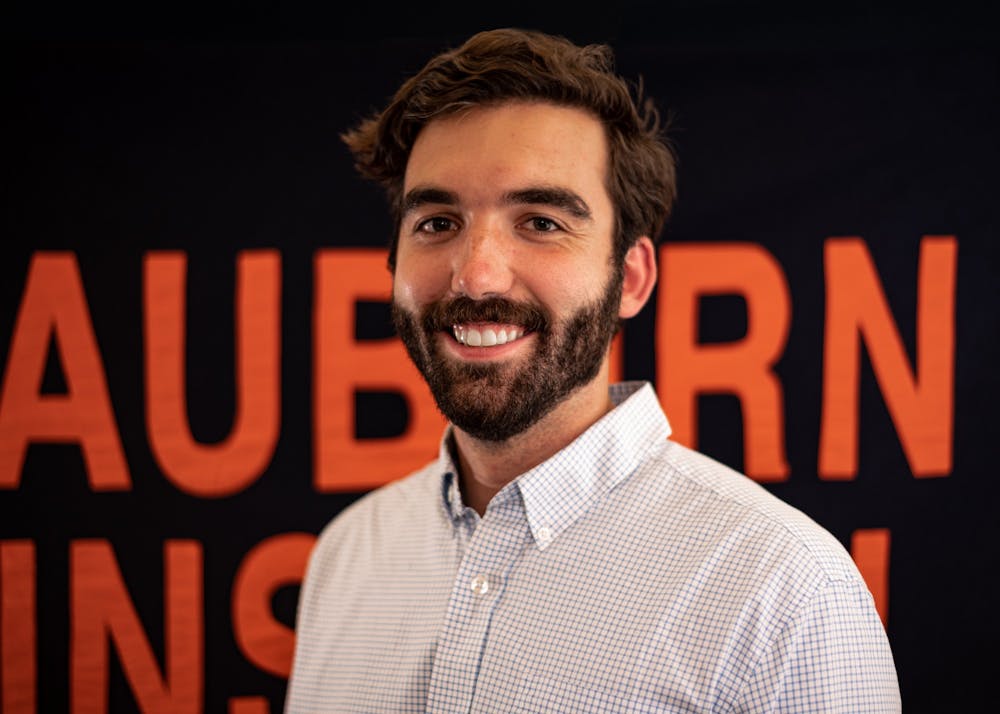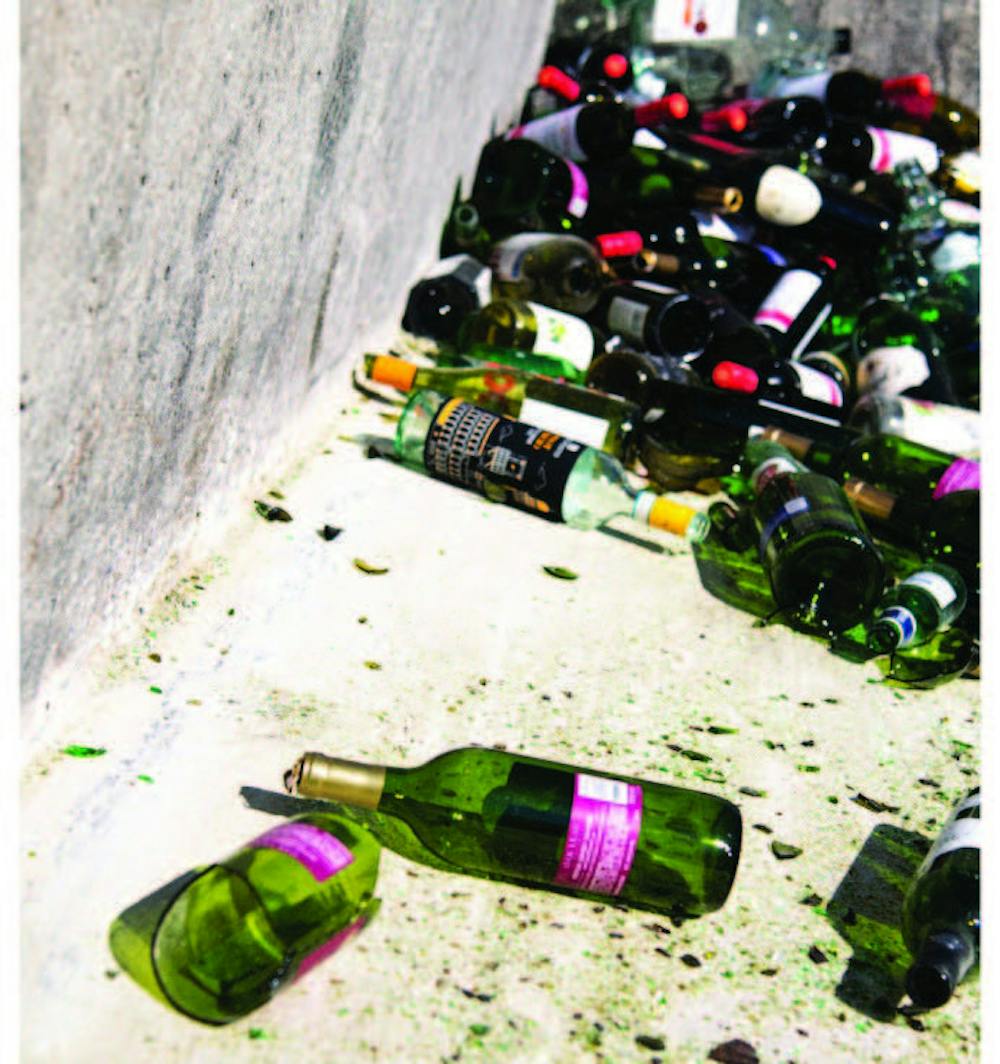Recycling in Auburn is a fairly straightforward process: Trash goes in the green cart. Recycling goes in the blue cart. The carts go to the street. After that, the resident’s job is done, and they pass the baton to the government to handle everything else.
But what happens next?
The City of Auburn collects its residents’ waste in five primary ways: with garbage trucks going to homes and a few businesses, recycling trucks going to most homes and a few businesses, trucks picking up yard waste and bulky items, the RecycleAuburn Drop Off Center at 365-A N. Donahue Drive and on the City’s Household Hazardous Waste Days. After collection, the waste goes to a different place depending on where it was picked up from.
Catrina Cook, environmental services director for the City of Auburn, sat down with The Plainsman to explain the ins and outs of the trash business.
Garbage
On a fully staffed day, seven-to-eight garbage collectors hit the road. They’ll collect from about 1,000 houses each.
As of early March, the City has 17,437 residential customers and 160 commercial customers for curbside pickup. Collectors pick up trash from as many that have their cart out on their scheduled day and time. If you forget to place your trash on the street, Cook said most of the time, they’ll come by to pick it up later if you give them a call.
After they’ve picked up trash from all the houses, the collectors drive the trucks to a drop off location in Opelika managed by GFL Environmental, a Toronto-based environmental services company. From there, GFL transfers the trash to a landfill in Tallassee, Alabama. The City pays GFL $27.46 per ton of garbage, which came out to a total of $468,440 in 2021, based on data from Cook.
Curbside Recycling
Of the 17,437 houses that the City picks up garbage from, 84.7% use the City’s single-stream recycling program. Single-stream allows the City to pick up all different recyclable materials from one bin, which makes the process easier for both customers and collectors.
“Everyone can toss everything in one container without source separating at the curb, so it’s … easier for the homeowner, it’s easier on our side being able to collect the material,” Cook said. “Before, we were having to use a few different trucks to collect the material, and now instead of four or five trucks coming around to your house you only get three.”
When recycling collectors pick up a recycling bin, they do a visual inspection of the bin’s contents to make sure there isn’t any contamination. Using the lever arm to pick up the bin, they peer inside with the six different cameras on the truck.
Once the recycling is picked up, the collectors drive it to Pratt Industries in Atlanta that same day. In 2021, the City delivered 2,804 tons of recycling to the company, which specializes in making recycled corrugated packaging. The City has a contract with Pratt which allows them to deliver their recyclables for free because most loads are free from contamination, Cook said.
Also, don’t put plastic bags in your recycling, Cook said.
Green Waste Division — Bulky and yard waste
When you cut down a tree or need to get rid of a mattress, both items are picked up by the City’s green waste division. The green waste division collects limbs, leaves, grass clippings, furniture, large electrical goods and other related material.
After these items are picked up, they’re taken to Sand Hill Recycling in Opelika. According to an environmental services informational presentation, 70% of material handled by the green waste division is recycled or reduced in volume. Much of the waste, once broken down, is used as landfill cover, which is laid on top of trash at landfills to control the emission of harsh odors, deter pests and prevent runoff.
During the City’s annual trash amnesty period, collectors will pick up anything that is left curbside free of charge. In 2022, trash amnesty runs from March 14-April 9.
RecycleAuburn Drop Off Center
Located at 365 N. Donahue Drive, the RecycleAuburn Drop Off Center is available for residents who aren’t customers of the City’s curbside recycling service. The drop off center also accepts glass recyclables, cooking grease and other waste products which are not accepted with curbside recycling.
The waste at the drop off center is sent to a different location than curbside recycling. The City sends these recyclables to Waste Recycling Inc. in Opelika and are paid by the ton since the items are separated by material, cutting down on the work required of Waste Recycling.
Household Hazardous Waste Days
The environmental services department hosts several household hazardous waste days each year, when residents can bring materials they can’t otherwise dispose of — things like used motor oil, antifreeze, swimming pool chemicals, pesticides and paint, as well as electronics.
Because of the dangers handling hazardous materials, the City brings a team of chemists from MXI Environmental Services, which is based out of Abingdon, Virginia, to ensure nothing harmful happens.
Once, the daughter of a chemist brought her father’s materials after he died, Cook recalled. Among the materials was picric acid, which can become a powerful explosive when dry. When the chemists discovered the danger, everyone had to evacuate and a bomb squad from Fort Benning came to handle the chemicals.
“We try to make sure that our employees have every opportunity to see exactly what they’re picking up, and we do all the things that we do to educate the public in what goes where so that we don’t come into that situation so that everyone is safe,” Cook said.
The City’s next household hazardous waste day is scheduled for March 26 from 9 a.m. to 1 p.m.
Other Waste
The City also uses a 600-gallon underground tank for downtown bars and restaurants to dump used cooking oil into. Restaurants dump used oil from a five-gallon bucket provided to them into the tank, which is emptied once every two weeks and taken to GEO Biofuel in Newnan, Georgia. There, the oil is recycled and turned into anything from dog food to make up.
Cook advised that electronics be taken to the environmental services building at 356 N. Donahue Drive, which are then sent to processors throughout the Southeast for recycling. For other types of waste that you aren’t sure how to dispose of, the City has an app called "What Goes Where?" on its website which allows users to search for items and shows them where it should be taken.
In the future, Cook said she hopes to see a lot of things change. Several years from now, Cook said the department should have a new materials recovery facility where they can aggregate all of the waste before hauling it off. Ideally, only one 18-wheeler will carry recycling to Atlanta, rather than five trucks a day.
For now, though, the environmental services department is busy, and Cook said the main asset they could use is more people.
“That’s one thing that doesn’t go anywhere,” she said. “You know recycling’s not going anywhere. You’re waiting on us. Garbage’s not going anywhere, and yard and bulky debris isn’t going anywhere.”
Do you like this story? The Plainsman doesn't accept money from tuition or student fees, and we don't charge a subscription fee. But you can donate to support The Plainsman.

Evan Mealins, senior in philosophy and economics, is the editor-in-chief of The Auburn Plainsman.





